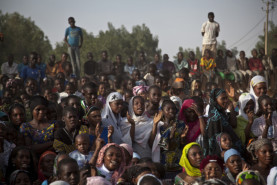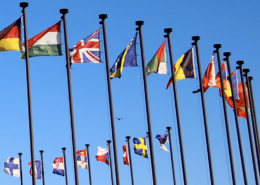Posted on 21 May 2016
The level of executions globally has reached a record high, with drug trafficking being by far the leading cause.
In its annual report, Death sentences and executions in 2015, Amnesty International identified two apparently contradictory key trends: a growing number of countries have taken steps to abolish the death penalty, but at the same time the total number of executions has risen dramatically, reaching a 25 year high.
 Source: Amnesty International (1991-2016). Visualisation of data excluding China.
Source: Amnesty International (1991-2016). Visualisation of data excluding China.
Three countries are responsible for 89% of the recorded death penalties: Iran, Pakistan and Saudi Arabia. Compared to 2014, Iran’s number of execution increased by 31%, Saudi Arabia’s by 76%, Egypt by 47% and Somalia by 79%.
The number of death sentences issued has also spiked with Egypt leading with over 538 confirmed death sentences.
Drug trafficking is #1 death penalty offense
Before this year, the use of the death penalty for drug-related offences appeared to be on the decline, but this trend has been dramatically reversed this year.
In the countries most frequently using the death penalty – Iran, Saudi Arabia and Pakistan – drug-related offences are the leading cause, with terrorism a close second:
- In Iran the ‘majority of executions carried out in 2015 were for drug-related offences. Iran’s Anti-Narcotics Law stipulates mandatory death sentences for a range of drug-related offences including trafficking more than 5kg of narcotics derived from opium or more than 30kg of heroin, morphine, cocaine or their chemical derivatives.’ By mid-October at least 500 of then 800+ executions were justified by punishing drug-related offences.
- Saudi Arabia also increasingly executes for drug related offenses: from just 4% In 2011, the percentage of drug related executions has risen to staggering 47% by June 2015. Of 158 executions, 64 were due to drug trafficking. So far this year, Saudi Arabia has already executed 86 people.
Drug related offences also drive the application of the death penalty in other countries:
- In Thailand, 55% of the prisoners on death row are convicted for drug-related offences.
- In Indonesia, 100% of executions were for drug trafficking, and 63% of new death sentences were drug-related.
- In Singapore, 75% of executions were for drug-related offences, and 80% of new sentences were imposed for drug trafficking.
- In Viet Nam, 57% of newly imposed death sentences were based on drug trafficking.
And whilst China does not release statistics, drug-related offences are punishable by death and likely to increase the number of drug-related death sentences and executions significantly.
At least one country, Oman, decided to revise a law that turns drug-related offences into death sentences. As Amnesty International reports, ‘on 11 October 2015, a revised law on combating drugs and narcotics, which prescribes the death penalty for a range of drug-related offences, came into force. Under the revised law the following people can be sentenced to death: drug traffickers; repeat offenders of drug crimes; public servants responsible for combating drug crimes found guilty of drug dealing; persons who use juveniles or orphans to commit drug crimes; persons involved with international drug trafficking gangs, and persons who abuse their power and immunity to commit or facilitate drug crimes’.
There is no clear evidence to prove that the death penalty is a deterrent to crimes such as organised drug trafficking nor the use of drugs for recreational purposes. In 2003, the International Narcotics Control Board acknowledged that the use of the death penalty can serve as impediment to the prosecution of drugs cases. The 2011 report of the Global Commission on Drugs argued strongly to experiment with policies that focus on harm reduction and legalisation measures. The wider impact of the criminalisation or decriminalisation of drug-related offenses (including drug possession) have been analysed in the 2012 report on the Global State of Harm Reduction by Harm Reduction International.
In a discussion about drug policy reform, it is time to bring the issue of the death penalty back on the agenda within a broader discussion about criminal justice reform in regards of drug-related offenses. Arguably, drug-related offenses do not meet the international standard of “most serious crimes” for which a death penalty may be applied. States that use the death penalty for drug-related offenses need to rethink how to combat drug trafficking more effectively without curtailing international standards and human rights.




